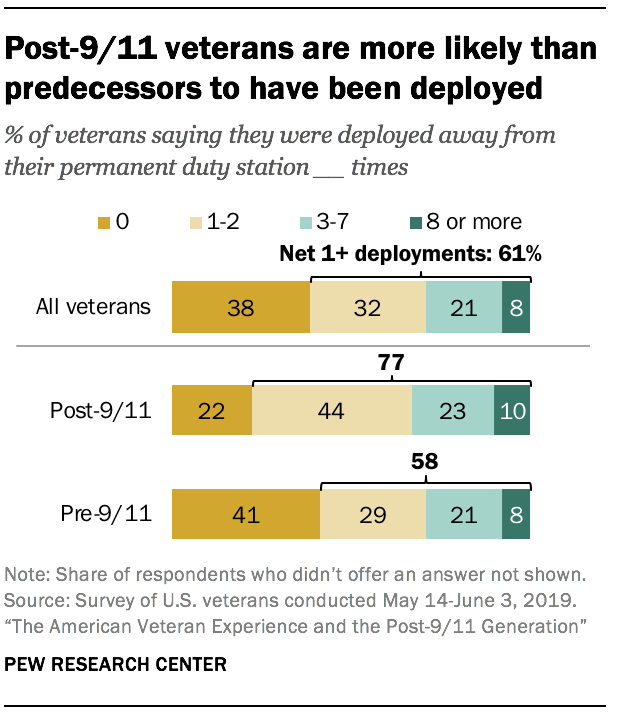 About six-in-ten veterans (61%) say they were deployed away from their permanent duty station at least once while they were on active duty, with roughly three-in-ten (29%) saying they were deployed three or more times. Roughly four-in-ten veterans (38%) were not deployed at all during their time in the military.
About six-in-ten veterans (61%) say they were deployed away from their permanent duty station at least once while they were on active duty, with roughly three-in-ten (29%) saying they were deployed three or more times. Roughly four-in-ten veterans (38%) were not deployed at all during their time in the military.
Post-9/11 veterans are much more likely to have been deployed than those who served in earlier eras. Roughly three-quarters of post-9/11 veterans (77%) were deployed at least once, compared with 58% of veterans who served only before 9/11.
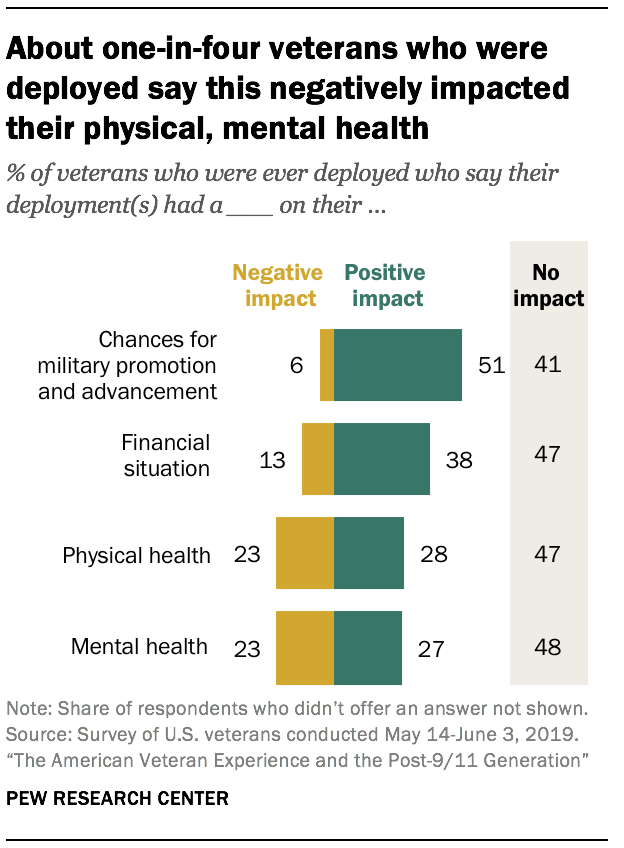 Veterans who served as noncommissioned officers (NCOs) (74%) are more likely than those who were commissioned officers (58%) or enlisted servicemembers (54%) to have been deployed at least once. And, among those who were deployed, NCOs are more likely than enlisted personnel to have had multiple deployments: 60% saw three or more deployments, compared with 36% among those who were enlisted.
Veterans who served as noncommissioned officers (NCOs) (74%) are more likely than those who were commissioned officers (58%) or enlisted servicemembers (54%) to have been deployed at least once. And, among those who were deployed, NCOs are more likely than enlisted personnel to have had multiple deployments: 60% saw three or more deployments, compared with 36% among those who were enlisted.
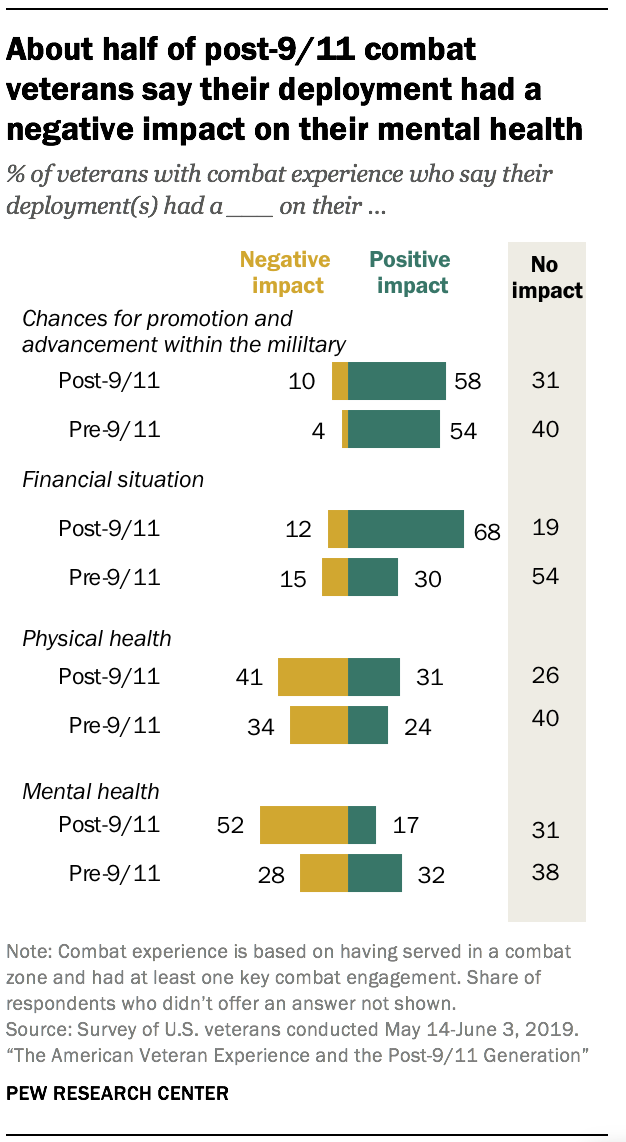 Many veterans report that their deployments were beneficial to their careers but had a mixed impact on their physical and mental health. Roughly half (51%) say their deployments had a positive impact on their chances for promotion and advancement within the military, and 38% say the impact on their financial situation was positive. Sizable shares say their deployments had no impact on these aspects of their life (41% for promotion and advancement, 47% for financial situation), and relatively few say deployment had a negative impact.
Many veterans report that their deployments were beneficial to their careers but had a mixed impact on their physical and mental health. Roughly half (51%) say their deployments had a positive impact on their chances for promotion and advancement within the military, and 38% say the impact on their financial situation was positive. Sizable shares say their deployments had no impact on these aspects of their life (41% for promotion and advancement, 47% for financial situation), and relatively few say deployment had a negative impact.
Among veterans who were deployed, 23% say their deployments had a negative impact on their physical health, and an identical share say being deployed impacted their mental health negatively. About three-in-ten say their deployments had a positive impact on their physical (28%) and mental (27%) health, while about half say they had no impact.
Veterans with combat experience are more likely to say there were financial benefits to being deployed: 44% of veterans with combat experience say their deployments had a positive impact on their financial situation, compared with 34% of veterans without combat experience. At the same time, combat veterans are more likely to say their deployments had a negative impact on their physical health: 37% say this, compared with 14% of veterans without combat experience. A similar pattern applies to their mental health.
Defining combat experience
In exploring the attitudes and experiences of America’s veterans, it was important to define what it means to have combat experience. In this report, to be considered a veteran with combat experience a respondent needed to have ever served in a combat or war zone, and answered yes to at least one of the following items:
- Did you ever go on combat patrols or missions?
- Were you ever exposed to hostile fire or did you ever come under attack?
- Did you ever fire your weapon at the enemy?
- Did you ever personally witness someone from your unit or an ally unit being seriously wounded or killed?
These questions are drawn from a longer list of items developed by the National Center for PTSD, a part of the U.S. Department of Veterans Affairs. The Deployment Risk and Resilience Inventory-2 is a suite of scales that can be used to assess deployment-related risk and resilience factors among veterans. The four questions above are modified versions of items from the Combat Experiences Scale, which is used to measure a number of combat-related experiences that veterans encounter.
Post-9/11 veterans are more likely than pre-9/11 veterans to say their deployments had a positive impact on their financial situation, and this is the case even after accounting for the fact that post-9/11 veterans are more likely to have combat experience. Fully 68% of post-9/11 veterans with combat experience say their deployments helped them financially, compared with 30% of pre-9/11 combat veterans. But they are also more likely to say their deployments negatively impacted their mental health: About half of post-9/11 combat veterans (52%) say this, compared with 28% of pre-9/11 combat veterans.
There are differences by gender. Among all veterans, women are more likely than male veterans to say their deployments had a negative impact on their mental health (39% vs. 22%).
When it comes to promotion and advancement within the military, officers are more likely than enlisted members to say they saw a positive impact from their deployments. About six-in-ten commissioned officers (61%) and noncommissioned officers (57%) say their deployments positively impacted their chances of advancement in the military, compared with 46% of enlisted servicemembers.
About six-in-ten combat veterans say they witnessed someone in their unit or an ally unit being injured or killed
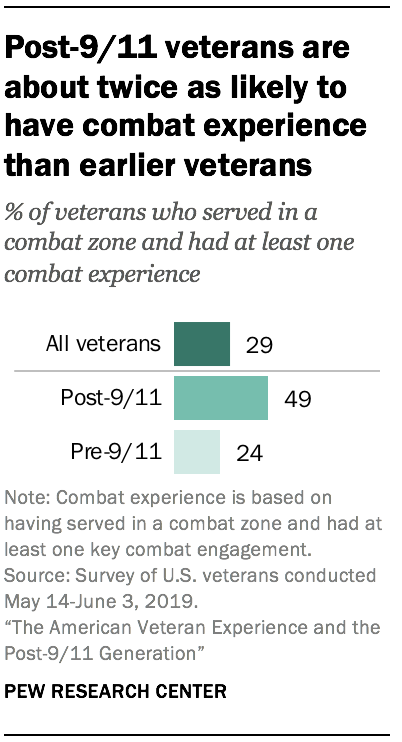
About three-in-ten veterans (29%) had combat experience at some point in their military career. The share is markedly higher among veterans who served after 9/11. Roughly half of post-9/11 veterans (49%) have had combat experience, compared with 24% of veterans who served only before 9/11.
About half of all veterans (51%) say someone they knew and served with was seriously injured while performing their military duties. This includes 35% who say they knew someone who was injured in combat and 16% who say the injury was not combat-related. Four-in-ten veterans say someone they knew and served with was killed while performing their duties (30% say this was combat-related, 10% say it was not).
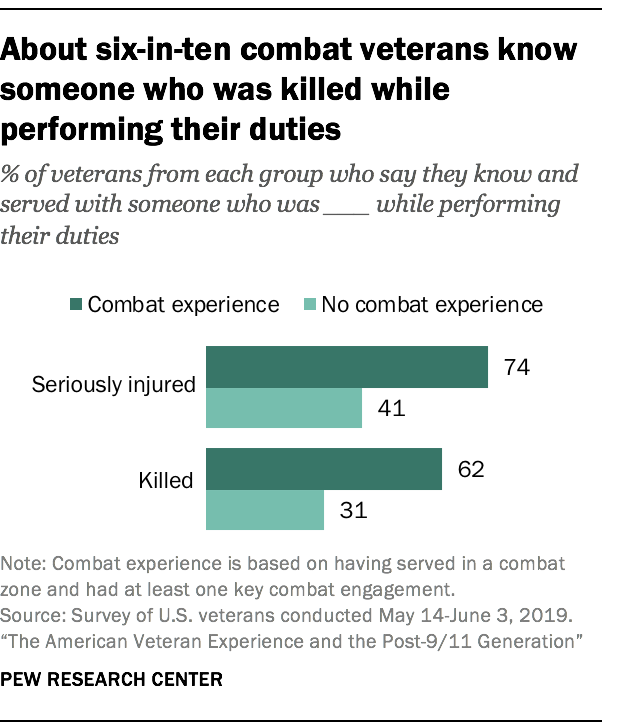 Veterans who have had combat experience are much more likely than those without it to know someone who was killed or injured. Roughly three-quarters of combat veterans (74%) say they know someone who was seriously injured while in the military, compared with 41% of veterans without combat experience.
Veterans who have had combat experience are much more likely than those without it to know someone who was killed or injured. Roughly three-quarters of combat veterans (74%) say they know someone who was seriously injured while in the military, compared with 41% of veterans without combat experience.
In addition, combat veterans are about twice as likely as those without combat experience to say they knew and served with someone who was killed while performing their duties (62% vs. 31%).
There are differences by rank in knowing someone who was injured or killed while performing their duties. Commissioned officers (54%) and noncommissioned officers (41%) are much more likely than enlisted servicemembers (28%) to say they know someone who was seriously injured in combat while performing their duties. Similarly, 43% of commissioned officers and 38% of noncommissioned officers say they knew someone who was killed in combat, compared with 22% of enlisted persons.
Many veterans saw these things first hand. Fully 57% of combat veterans say they personally witnessed someone from their unit or an ally unit being seriously wounded or killed. Veterans across rank and era of service are about equally likely to have had this experience.
One-in-five veterans say they, themselves, were seriously injured while performing their military duties: 5% say they were injured in combat and an additional 15% say their injury was not combat-related. Among veterans who have had combat experience, 16% say they were seriously injured in combat.
About half of post-9/11 combat veterans say they think they have suffered from PTS
Given the wide reach of these experiences, it’s not surprising that many veterans report that there was some emotional trauma associated with their military service. Three-in-ten veterans overall say they had emotionally traumatic or distressing experiences related to their military service. Some 15% say they have sought help for emotional issues resulting from their military experience. And 18% say, regardless of whether they sought help, they believe they have suffered from post-traumatic stress (PTS) as a result of their experiences in the military.
Across all three measures, there are significant gaps between veterans who served before 9/11 and those who served after. About half of post-9/11 veterans (47%) say they had emotionally traumatic or distressing experiences, compared with one-quarter of pre-9/11 veterans. Similarly, about one-third of post-9/11 veterans (35%) say they sought help for emotional issues, compared with just one-in-ten pre-9/11 veterans. Post-9/11 veterans are also more likely than pre-9/11 veterans to say they have suffered from PTS (36% vs 14%).
Not surprisingly, veterans with combat experience are more likely to have had traumatic experiences. About half of all combat veterans (52%) say they had emotionally traumatic experiences related to their military service. Post-9/11 combat veterans are especially likely to say this (62%). About three-in-ten combat veterans (31%) say they sought help for emotional issues resulting from their service, compared with 8% of veterans without combat experience. Again, veterans who served in combat after 9/11 are particularly likely to have sought help – 48% say they sought help from a doctor or counselor for emotional issues resulting from their service.
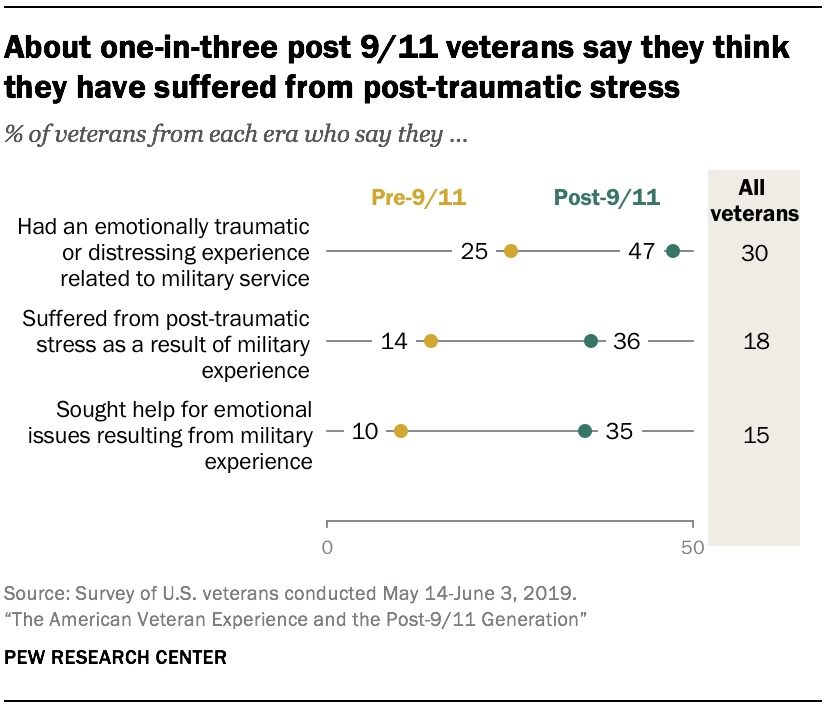 Combat veterans are also especially likely to report having PTS. Fully 44% of combat veterans say they believe they have suffered from PTS as a result of their military experience, compared with 8% of non-combat veterans. Among combat veterans, 55% of those who served after 9/11 say they have suffered from PTS, compared with 38% of those who served only before 9/11.
Combat veterans are also especially likely to report having PTS. Fully 44% of combat veterans say they believe they have suffered from PTS as a result of their military experience, compared with 8% of non-combat veterans. Among combat veterans, 55% of those who served after 9/11 say they have suffered from PTS, compared with 38% of those who served only before 9/11.
Traumatic experiences and PTS are closely correlated: Roughly half (51%) of veterans who say they had emotionally traumatic or distressing experiences while in the military also say they have suffered from PTS. Only 4% of those who didn’t have traumatic experiences say they have had PTS.
Relatedly, 31% of all veterans who know and served with someone who was killed while performing their duties say they have suffered from PTS, compared with 10% of those who don’t know someone who was killed. That number jumps to 50% among post-9/11 veterans who know someone who was killed.
About seven-in-ten combat veterans say their experiences made them feel closer to those who fought beside them
For many veterans, the emotional burdens of combat have given them greater insight into themselves and taught them important lessons. Fully 56% of combat veterans say their experiences in combat changed their priorities about what is important in their lives. Some 16% say these experiences didn’t change their priorities and 27% say they didn’t make much of a difference. Similar shares of post-9/11 (58%) and pre-9/11 (55%) veterans say their combat experiences changed their priorities. Veterans who had emotionally traumatic experiences related to their military service are especially likely to report that their priorities changed: 69% say combat changed what was important in their life.
About seven-in-ten combat veterans (69%) say their combat experiences made them feel closer to those who fought alongside them. Just 4% say these experiences made them feel more distant from those they fought with, and one-quarter say they didn’t make a difference. Veterans who served after 9/11 are more likely to say their combat experiences made them feel closer to those who they served with: 77% of post-9/11 combat veterans say this, compared with 65% of pre-9/11 combat veterans. Again, the nature of their combat experiences is linked to impact, as veterans who say they had emotionally traumatic experiences are among the most likely to say their combat experiences made them feel closer to those they served alongside (81% say this).
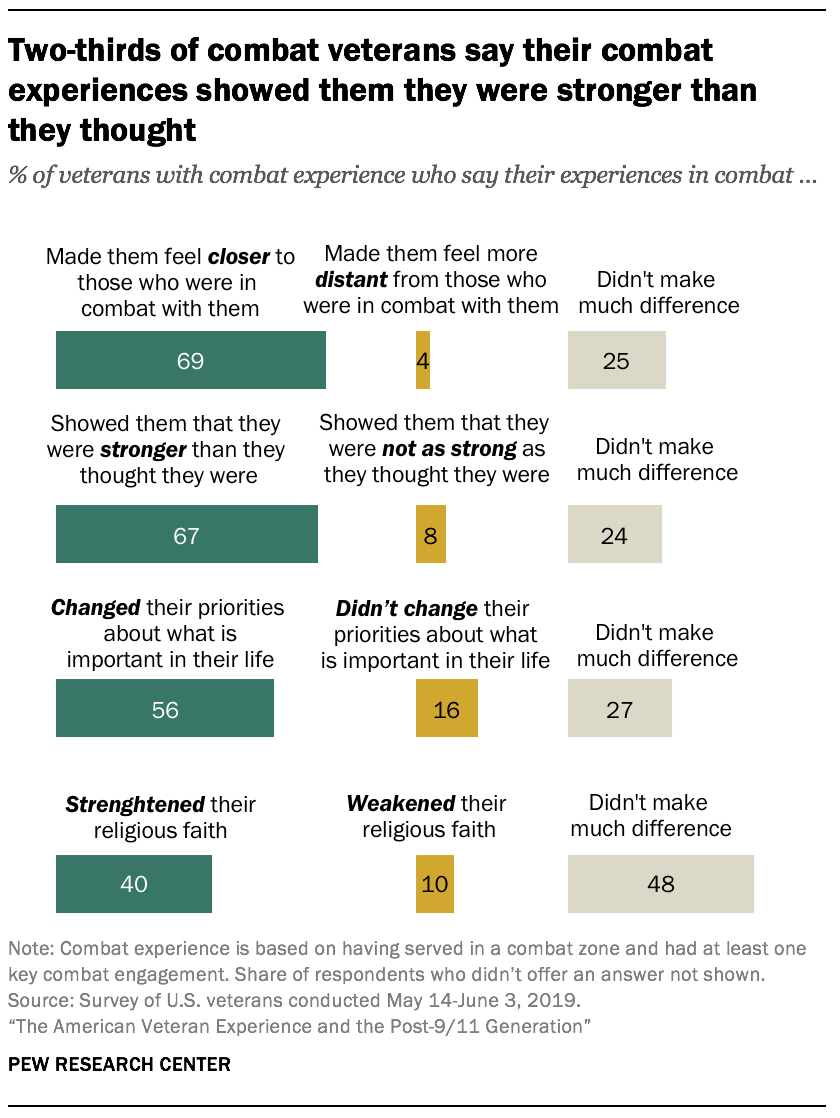 A majority of combat veterans also say their experiences in combat showed them that they were stronger than they thought, while only 8% of combat veterans say these experiences showed them they were not as strong as they thought. About one-quarter (24%) say their experiences didn’t make much of a difference in this regard.
A majority of combat veterans also say their experiences in combat showed them that they were stronger than they thought, while only 8% of combat veterans say these experiences showed them they were not as strong as they thought. About one-quarter (24%) say their experiences didn’t make much of a difference in this regard.
About half of combat veterans (48%) say their combat experiences didn’t make much of a difference when it came to their religious faith. Still, four-in-ten say their combat experiences strengthened their religious faith and one-in-ten say they weakened their religious faith.


